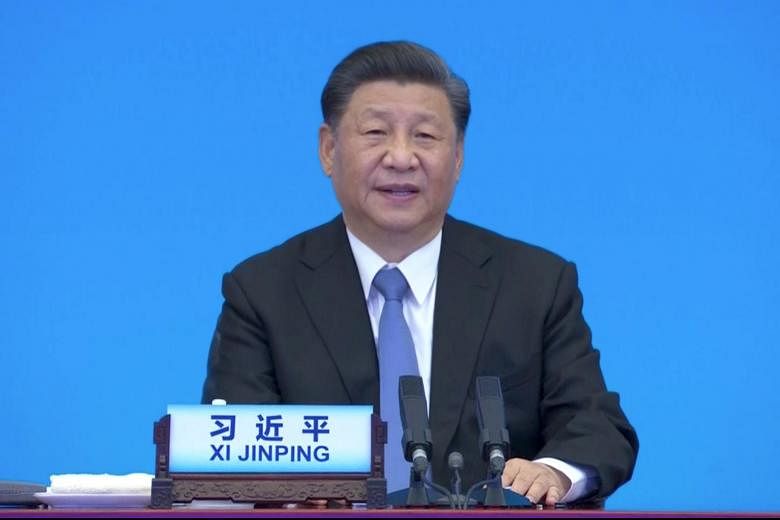BEIJING (BLOOMBERG) - Chinese President Xi Jinping's use of the term "common prosperity" surged this year, evidence of the Communist Party of China's commitment to closing the country's yawning wealth gap.
The term appeared sporadically in his first eight years in power.
Last year, he began to reference "common prosperity" more often and has picked up the pace: The phrase has appeared 65 times in his speeches and meetings so far this year, compared with 30 in all of last year.
The sloganeering signals the strength of Mr Xi's intent, said Ms Maria Repnikova, who studies China's political communication at Georgia State University.
"Slogans often capture new policy directions or shifts and can signal how the policy is changing," she said. "They're also often broad, leaving some space for ambiguity and adjustment in interpretation."
The government put a finer point on it last week.
The party's top economic and financial affairs committee vowed at a meeting last Tuesday (Aug 17) to "reasonably adjust high incomes", encourage philanthropy and pursue other strategies to bring the country's income distribution into the more ideal olive-shaped structure, small on both ends and fat in the middle.
During the meeting, top policymakers pledged to use "taxation, social security and transfer payment" policies and to tackle illegal and "unreasonable" income.
They also suggested that Mr Xi's target may for the first time expand to include the merely wealthy in addition to the ultra-rich.
Mr Xi had previously focused on "excessively high income", according to a Bloomberg analysis of his speeches.
There is no official definition of the two groups, but the overall egalitarian push seems to implicate a wider swathe of top earners.
The idea of "common prosperity" was originally introduced into party documents by Mao Zedong to reflect the pursuit of a more egalitarian society.
It fell out of frequent use under Deng Xiaoping, who shifted the focus to developing an economy that would allow "some people to get rich first". Common prosperity, he said, would come later.
China's richest 20 per cent earn more than 10 times the poorest 20 per cent, a gap that has not budged since 2015.
The country counts 400 million people - about one-third of its population - in its middle class, defined as those with annual household income between 100,000 yuan (S$21,000) and 500,000 yuan. More than 600 million people in China still live on a monthly income of 1,000 yuan.
In a series of front-page commentaries published in recent days, the official Economic Daily newspaper said China needed to "prevent the trap of high welfare" and "avoid over-emphasising material comfort", suggesting caution against people slacking off as a result of the common-prosperity push.
The government needed to implement policies that encourage people to achieve wealth through hard work and innovation, the newspaper said.
The party has acknowledged the "difficulty and complexity" of the task at hand and has asked local governments to "gradually push forward".
Mr Xi pledged last year to make "more substantial progress on common prosperity for all" by 2035.
A pilot programme in Zhejiang province is designed to narrow the income gap there by 2025.

